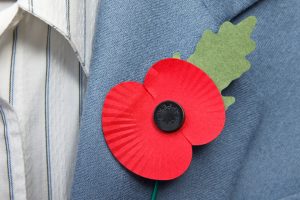 Remembering those who fought fascism, and the impact of racism in the UK following Brexit
Remembering those who fought fascism, and the impact of racism in the UK following Brexit
It’s that time of year when we’re supposed to remember those who have sacrificed their life for their country, and that time of year when all those who haven’t, have an opinion on the wearing of poppies. Every year like that leading up to this Remembrance Day, there’s always a debate about who should and who should not wear a poppy. Just the other day, the Prime Minister, Theresa May condemned the ‘utterly outrageous’ Fifa poppy ban for England and Scotland players.
For me, the Fifa decision like so many are a distraction and disservice to those who have died. I don’t like being told to wear a poppy, and not to wear one. I’m more concerned about why those who want to, do not. As I wrote last year, many are excluded around Remembrance Day. As a person of colour, I understand why some like me feel this way. Black veterans have spoken out about being snubbed at the annual ceremonies, which is sad when you come to think about it.
Many hundreds of thousands of non-white people died to keep Britain great, with British and Commonwealth soldiers fighting fascism and racism alongside each other. Brown and white faces. The total number of Commonwealth war dead during WWI being 979,498, greater than the entire combined populations of the two Northern English cities I’ve lived in prior to London – Liverpool, and Manchester. If these brothers-in-arms would have failed, what would the UK be like now?
That’s why it angers me that after Brexit, as a nation we have become intolerant. Britain and her allies defeated hate, yet we have seen much of it after the vote to leave the European Union. And much of this, committed against people who look like me and those from Eastern Europe. It’s one reason many Black, Asian and Minority Ethnic Britons feel excluded around national events by the antics of organisations such as UKIP, who use minorities and others as a reason to stir up hate and division. But then I think they do not speak for the British nation, so why do we allow them to?
Equally though, I don’t understand why some BAME people call for others not to wear poppies, because they are racist and British troops have invaded non-white countries. Soldiers serve, do what they’re told, and go where they’re told. They carry out the will of Parliament, and is not for them to question this democracy – rightly or wrongly. Politics is political. Dying for your country isn’t.
Some commentators say that wearing a poppy is political, but it’s not. It is and should be about remembering the dead. You don’t have to agree with wars, to give thought to those who made the ultimate sacrifice for this country. But that doesn’t mean I don’t understand where they and others are coming from. I have written myself that I find remembering 11 November difficult, which lots of others share. Many people like me and especially those younger don’t know how to acknowledge Remembrance Day, not because they don’t support it, but because they feel they don’t fit in.
The racism we have seen following Brexit does not help, especially that towards Muslims. As a Christian, I acknowledge that 400,000 Muslims fought for Britain during World War One. If it had not been for the soldiers of the past, our being now may not have happened. My white mother and black father meeting in Liverpool, would have been a non-starter under a fascist regime. Wear a poppy, don’t wear a poppy, as there’s lots of ways to remember the dead. But stop making wearing a poppy political, because it’s not. To do so doesn’t mean you condone the wars in Iraq, Afghanistan, Libya and so forth, but to remember those fallen in the name of freedom.
Lest We Forget.